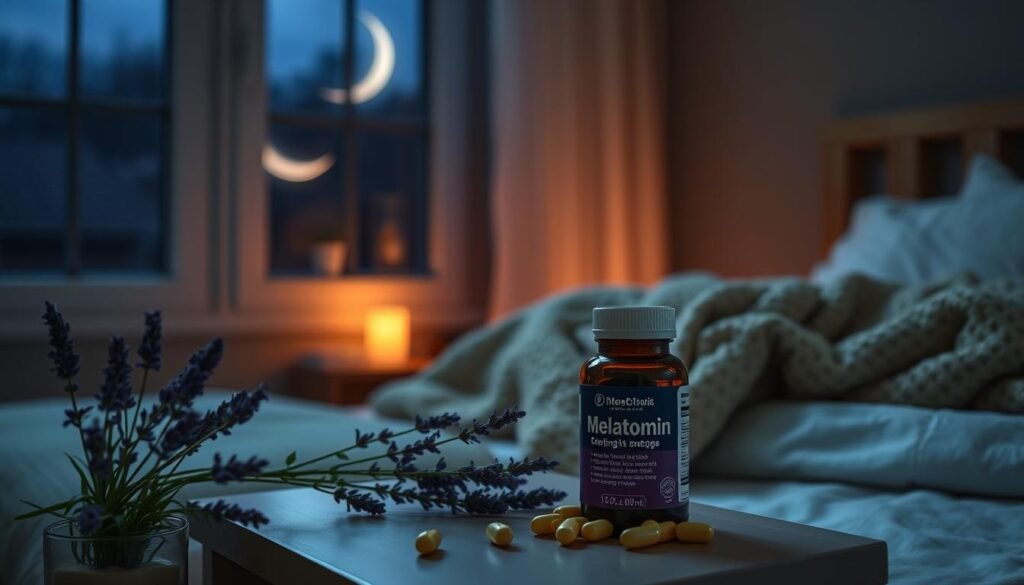Anxiety is a big issue, affecting up to 20% of adults each year. It also impacts 1 in 4 children aged 13-18. A natural solution many are looking at is melatonin. This hormone mainly helps with sleep but recently, research has shown it might help with anxiety relief too. This is especially true in the case of anxiety before surgery. This article will look at how melatonin can affect anxiety, the positives of using it, and some things to be cautious about.
Sleep and anxiety are closely linked. Understanding this connection helps to see how melatonin benefits might work. We’ll explore how melatonin works in the body, how it might help with managing anxiety, and what you need to know if you’re thinking about using it to help you sleep.
Key Takeaways
- Anxiety disorders affect millions around the world, showing the need for helpful treatments.
- Melatonin could help ease anxiety in situations like before surgery.
- It’s important to know how melatonin works in managing sleep to appreciate its benefits.
- Things like your age and how much light you’re exposed to can change your melatonin levels. This might affect your anxiety levels.
- There are many supplements and therapies that can work well with melatonin for better mental health.
Understanding Melatonin: What Is It?
Melatonin is a key melatonin hormone made by the pineal gland. It mainly gets made when it’s dark. This hormone helps control our sleep-wake cycle and affects many sleep-related processes. The body makes it from tryptophan. Its levels go up at night to make us sleepy and keep our sleep rhythms in check.
For those having trouble sleeping, like with insomnia or jet lag, this natural sleep aid can help. Studies show melatonin can make it quicker to fall asleep and improve sleep consistency. It’s especially helpful for those with circadian rhythm issues, like shift work sleep disorder.
Melatonin’s role ties closely with our daily sleep habits. As it gets darker and melatonin levels increase, our body gets the hint to start winding down. This uptick in the melatonin hormone prepares us for sleep by promoting relaxation.
To wrap up, diving into melatonin’s details shows us its vital role in sleep management and its benefits for anxiety. Understanding how melatonin functions can help us see its importance in boosting sleep quality and overall health.
The Role of Melatonin in Sleep Regulation
Melatonin is key in controlling our sleep. It manages circadian rhythms. This hormone is made more at night and less during the day. This matches our internal clock. It tells our body when it’s time to sleep.
As we get older, we make less melatonin. Before puberty, we make the most. But after 40, it starts to decrease. Older adults have much less, which may cause sleep problems like insomnia. This often makes anxiety worse. It’s vital to understand these changes to find good insomnia remedies.
When melatonin levels are off, it might lead to hypomelatoninemia. This causes sleep schedule issues like delayed sleep phase disorder. Low melatonin can come from medications, illnesses, and the environment. Too much melatonin causes hypermelatoninemia. This makes you sleepy and dizzy during the day.
Many people use melatonin supplements to sleep better. These supplements help you fall asleep faster, especially with delayed sleep phase disorder. They also help with jet lag and sleep problems from disabilities.
| Age Group | Melatonin Production Level | Potential Sleep Issues |
|---|---|---|
| Pre-Puberty | Peak Levels | Minimal Sleep Issues |
| Age 40+ | Declining Levels | Insomnia Risk Increases |
| Over 90 | Less than 20% of Young Adult Levels | High Risk of Sleep Disorders |
To sum up, it’s important to keep melatonin levels healthy for good sleep and well-being. Knowing how it affects sleep can help us find the right sleep help and remedies.
Melatonin’s Physiological Effects
Melatonin has many uses, not just for sleep. It has antioxidant properties. These help protect our cells against damage. This is crucial as damage can lead to health problems, like anxiety disorders.
The physiological actions of melatonin help balance our moods. It does this by affecting our brain chemicals. It also protects our brain cells, helping those with anxiety.
Melatonin production drops as we age. This can make sleep problems worse, raising anxiety levels. Diseases like diabetes and Alzheimer’s can lower melatonin too. Blue light at night also reduces it.
Clinical studies show melatonin’s benefit against anxiety. It can be as good as some medications, especially before surgery. Doses range from 3 to 10 milligrams, taken before bed.
While helpful for sleep, melatonin can have side effects. Some people might get dizzy, have headaches, or experience vivid dreams. On rare occasions, it can cause serious issues. Always talk to a doctor before starting melatonin.
| Condition | Melatonin Effectiveness | Common Side Effects |
|---|---|---|
| Sleep Disorders | Improves sleep quality | Dizziness, headache |
| Anxiety Disorders | Reduces anxiety symptoms | Vivid dreams, nausea |
| Oxidative Stress | Provides neuroprotection | Dry mouth, upset stomach |
Melatonin does more than just help us sleep. It plays a big role in our mental health.
Does Melatonin Help With Anxiety?
Studies show melatonin may help ease anxiety symptoms. It’s especially useful in high-stress situations, like before surgery or during tough life events. People are noticing its benefits as an anxiety relief supplement. Both health experts and those looking for natural treatments are paying attention.
Research Evidence on Melatonin and Anxiety
Many studies confirm melatonin’s effectiveness for anxiety disorders. A review in 2020 found melatonin helps reduce anxiety before operations better than a placebo. In heart surgery patients, it even did better than oxazepam, a common anxiety medication. This supports the idea of using melatonin in certain cases.
Specific Situations Where Melatonin May Help
How well melatonin works depends on the situation. Here are a few areas where it helps:
- Preoperative Anxiety: Studies show a drop in anxiety before surgery with melatonin use.
- Sleep Disturbances: Improving sleep with melatonin helps lower anxiety for many.
- Chronic Stress: Those facing ongoing stress from big life changes or health issues may find melatonin useful.

Melatonin’s use in managing anxiety is growing. It’s being added to anxiety relief supplements more often. Although it’s not perfect for everyone, melatonin offers hope for anxiety relief with careful, personalized use.
Melatonin and Sleep Disorders
Melatonin is key in managing sleep disorders like insomnia. Our bodies make this hormone to control our sleep-wake cycles. If you’re having trouble sleeping, melatonin for insomnia might help. It’s shown promise for delayed sleep-phase syndrome, where falling asleep on time is hard.
More kids and teens are now using melatonin for their sleep issues. A study from Sweden found 87% of young melatonin users had diagnoses like anxiety or depression. This highlights how critical it is to use sleep aids carefully. Proper use of melatonin can boost sleep quality and decrease harmful behaviors in teens after treatment.
In Australia, melatonin gummies are a hit among parents for their kids. The Therapeutic Goods Administration (TGA) approves its use for autism and Smith-Magenis syndrome in children. Yet, experts urge caution against misuse. They recommend first addressing the underlying sleep disturbances. A balanced strategy involves behavior changes and introducing melatonin gradually.
Melatonin isn’t a cure-all for every sleep problem. It’s wise to chat with a doctor before starting it to avoid side effects or drug interactions. For more on how melatonin aids with sleep issues, read this article.
Melatonin Benefits Beyond Sleep
Melatonin is not just about better sleep. It also helps with mental health and overall happiness. This hormone has many roles that are good for your health.
Studies show melatonin can help with anxiety treatment. It might lower stress and make you feel less worried. This is great news for those looking for natural aids for anxiety.
It also seems to boost mood. People with seasonal affective disorder (SAD) might get better with melatonin. It helps fix their body clocks, reducing seasonal depression symptoms.
Melatonin is also good for your eyes. One study found it protects the retina in people with age-related vision problems. It keeps their vision clear. This is another way melatonin benefits us, not just with sleep.
Here’s a table listing melatonin’s different benefits:
| Benefit | Description |
|---|---|
| Stress Reduction | Helps alleviate stress-related psychological issues. |
| Anxiety Relief | May reduce feelings of anxiety and agitation. |
| Seasonal Affective Disorder | Reduces symptoms by regulating circadian rhythms. |
| Eye Health | Protects retina and preserves visual clarity. |
| Enhanced Mood | Aids in improving overall mood balance. |

Melatonin has many benefits, making it a key part of mental health care. It could be a smart addition to daily health routines. This helps in caring for your well-being in a complete way.
Choosing Melatonin as an Anxiety Relief Supplement
Many people look at melatonin for anxiety relief. There are several types of melatonin to choose from. Knowing the types and product quality is key for good results.
Different Forms of Melatonin Supplements
Melatonin comes in tablets, gummies, transdermal patches, and liquids. Each form suits different needs and preferences.
- Tablets: Standard pills that provide a precise dosage of melatonin.
- Gummies: Tasty alternatives that are easy to consume, especially for those who dislike swallowing pills.
- Transdermal patches: Offer a convenient option for sustained release throughout the night.
- Liquids: Allow for adjusted dosing and faster absorption into the bloodstream.
Quality and Regulation of Melatonin Products
The quality of melatonin products can vary. The FDA does not strictly regulate dietary supplements. It’s important to choose supplements from reputable sources. Look for third-party certifications like the USP to ensure safety and effectiveness.
| Form of Melatonin | Pros | Cons |
|---|---|---|
| Tablets | Easy to dose; widely available. | May take longer to dissolve. |
| Gummies | Tasty and fun; easy to consume. | May contain added sugars; dosages can vary. |
| Transdermal patches | Offers prolonged release; convenient. | More expensive; requires proper application. |
| Liquids | Quick absorption; flexible dosing. | May have an unpleasant taste. |
Choose quality melatonin for safe and effective anxiety relief. Research brands and their certifications. This helps in managing anxiety with melatonin.
Melatonin Dosage Recommendations
Knowing the right melatonin dosage is key to reducing anxiety. You can find melatonin in doses ranging from 1 milligram (mg) to 10 mg and even more. It’s smart to start with a small dose and then see how you react, remembering the dosage guidelines.
Dr. Goldman advises to start with 1 mg about 30 minutes before bedtime. You can raise it by 1 mg weekly until you get the results you want, but don’t go over 10 mg. This careful method helps ensure safe melatonin use while reducing side effects.
Studies point out that 3 mg to 14 mg is the usual dosage for easing anxiety, especially before surgery. Melatonin works as well as benzodiazepines but has gentler side effects. Generally, adults take 1 to 5 mg roughly 30 minutes before bedtime.
For kids, the dose might be lower, like 1 to 2 mg for little ones in preschool and 1 to 5 mg for teens. Parents should talk to a doctor before giving melatonin to their children. Older adults need to consult a healthcare provider too, as they might be more sensitive or have drug interactions.
| Group | Recommended Dosage |
|---|---|
| Adults | 1 to 10 mg |
| Preschoolers | 1 to 2 mg |
| School-aged Children | 1 to 3 mg |
| Adolescents | 1 to 5 mg |
Be careful mixing melatonin with things like alcohol or caffeine. It can make it less effective. It’s best to talk with a healthcare professional to understand any risks. This way, you can use melatonin safely and get the anxiety relief you need.
Potential Melatonin Side Effects
Melatonin is seen as a safe, natural way to better sleep. But, it can have some side effects. Most melatonin side effects are minor, but important for users to know. Knowing about these side effects of melatonin ensures its safe use.
Common Side Effects to Be Aware Of
The most common side effects of melatonin are:
- Daytime sleepiness
- Headaches
- Dizziness
- Nausea
- Vivid dreams or nightmares
- Stomach cramps
- Mood changes
In kids, short-term side effects can include more nighttime peeing and feeling restless. It’s crucial to watch the dose because supplements might not show true amounts. This helps avoid negative effects.
Interactions with Other Medications
Melatonin might not mix well with some drugs, like blood thinners. This could make health issues worse. People on antidepressants or other medicines should talk to a doctor before taking melatonin. Knowing about possible mix-ups can keep you safe.
Complementary Anxiety Relief Strategies
Anxiety is common worldwide. Many seek ways to handle it, using traditional and holistic methods. Melatonin is favored for its ability to improve sleep, but there are other strategies to consider.
Adding methods like acupuncture, massage therapy, mindfulness, and relaxation techniques can offer a full plan for managing anxiety. These approaches work well with melatonin and support overall health.
Many studies support these methods. Mindfulness, for instance, helps lessen anxiety by promoting peace and clear thinking. Acupuncture and massage therapy can ease stress and boost mood, leading to tranquility.
Adding foods like chamomile and kava might help, yet caution is important due to potential health concerns. Kava, in particular, could harm the liver. Always talk to a medical professional before trying new methods for anxiety relief.
Here’s a detailed overview of various complementary strategies for anxiety relief:
| Strategy | Description | Potential Benefits |
|---|---|---|
| Acupuncture | Insertion of needles at specific points to promote energy flow. | May reduce anxiety symptoms and improve relaxation. |
| Massage Therapy | Manipulation of soft tissues to alleviate tension. | Can improve mood and decrease stress levels. |
| Mindfulness Meditation | A practice that encourages present-moment awareness. | May enhance emotional regulation and lower anxiety. |
| Relaxation Techniques | Methods such as deep breathing or progressive muscle relaxation. | Helps induce calm and decrease anxious feelings. |
| Herbal Remedies | Natural options like chamomile and kava often used for relief. | Could provide soothing effects, although some have risks. |
Looking at anxiety with a holistic view may bring better results. Combining different strategies can improve the benefits of melatonin. They offer many ways to heal and find support. More studies are needed to understand these methods fully. Learn more about this area of research at anxiety and complementary health approaches.

Stress Management Techniques
Managing stress is key to better health, especially when facing anxiety. Many techniques for anxiety relief help people build resistance to stress. A national survey found that 44 percent of adults had stress-related insomnia at least once last month. This shows how important good mental health practices are.
Exercise is a great anxiety coping strategy. Just 30 minutes a day of jogging, cycling, or brisk walking can make a big difference. Doing breathing exercises and muscle relaxation for 20 to 25 minutes daily also helps. Yoga, tai chi, and meditation can reduce stress hormones and calm the mind.
Mindfulness meditation is another powerful tool against anxiety. It keeps you in the moment and fights overwhelm. Keeping a gratitude journal helps improve mental health and reduce anxiety too.
Cognitive-behavioral therapy (CBT) is very effective for stress and anxiety. Taking regular breaks, like with the Pomodoro Technique, offers mental rest. It’s also important to set boundaries, especially when working remotely.
| Technique | Description | Duration |
|---|---|---|
| Deep Breathing | Calms the mind by activating the body’s relaxation response | 5-10 minutes daily |
| Progressive Muscle Relaxation | Reduces muscle tension and promotes relaxation | 20-25 minutes daily |
| Mindfulness Meditation | Enhances present-moment awareness and reduces anxiety | 10-15 minutes daily |
| Yoga/Tai Chi | Combines movement, meditation, and breathing for stress relief | 30-60 minutes several times per week |
For those overwhelmed by anxiety, online anxiety screening tools offer a chance for self-evaluation. By using different stress management techniques, anyone can boost their mental and emotional health for a better life.
Conclusion
Melatonin has become a powerful natural choice for those looking for anxiety relief. It’s especially useful before surgery or for fibromyalgia patients. Studies show melatonin can work as well as benzodiazepines in calming pre-surgery nerves. Also, it helps people sleep better which can reduce anxiety.
However, melatonin isn’t a cure-all. Its effects aren’t the same for everyone, like those with colorectal cancer. Also, it can cause morning tiredness and headaches. People should consider using melatonin with other treatments to improve their health.
Adding melatonin to your treatment plan might help with anxiety and sleep problems. Always talk to a doctor to make sure it’s right for you. This way, you can take care of your health in the best way possible.